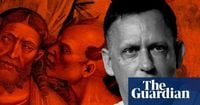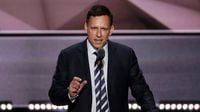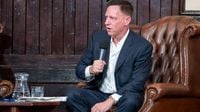In a series of sold-out private lectures this autumn, Silicon Valley billionaire and political influencer Peter Thiel ignited controversy by weaving together biblical prophecy, technology policy, and contemporary politics—culminating in his branding of Swedish climate activist Greta Thunberg and leading artificial intelligence (AI) critics as "legionnaires of the Antichrist." The lectures, delivered over four sessions at San Francisco’s Commonwealth Club from September 15 to October 6, 2025, were strictly off the record for attendees, but recordings obtained by major outlets, including The Washington Post and The Guardian, have since pulled back the curtain on Thiel’s provocative worldview.
Thiel, whose net worth hovers around $27 billion and who has deep ties to the Trump administration, used the lectures to argue that those calling for regulation of emerging technologies—particularly AI—pose an existential threat to scientific progress and, by extension, to the United States itself. According to The Washington Post, Thiel went so far as to claim that, "In the 21st century, the Antichrist is a Luddite who wants to stop all science. It’s someone like Greta or Eliezer," referencing Thunberg and AI safety researcher Eliezer Yudkowsky by name.
Thiel’s lectures, totaling eight hours, blended religious doctrine with warnings about the dangers of technology regulation. He drew on biblical passages such as Matthew 24:6—"You shall hear of wars and rumours of wars"—to argue that the Antichrist would rise by spreading fear about existential threats like climate change and AI, convincing the public to accept a unifying global authority that would stifle technological advancement. As he put it, "The antichrist comes to power by talking constantly about Armageddon, about rumours of wars and scaring you into giving him control over science and technology."
This framing, Thiel suggested, is not merely theoretical but already manifesting in the form of international agencies and regulatory bodies. He described the increasing difficulty for the wealthy to hide assets as evidence of a growing "machinery of tax treaties, financial surveillance, and sanctions architecture"—a system he warned could easily be commandeered by an Antichrist figure. "It’s become quite difficult to hide one’s money," Thiel lamented, suggesting that such financial oversight is a harbinger of a one-world government with the potential for tyranny.
Thiel’s vision is not limited to religious allegory. He peppered his talks with references to literature, pop culture, and recent world events. Drawing on works like Francis Bacon’s New Atlantis, Jonathan Swift’s Gulliver’s Travels, Alan Moore’s Watchmen, and Eiichiro Oda’s manga One Piece, Thiel illustrated how the concept of the Antichrist has evolved in the cultural imagination—from mad scientist to anti-science demagogue. In his analysis, the Antichrist of today would be a "youthful conqueror," someone able to rally the world against scientific progress under the banner of existential risk.
Ironically, Thiel’s own relationship with AI critics is complex. As reported by Gizmodo and corroborated by The Washington Post, Thiel was an early backer of Eliezer Yudkowsky, funding his Singularity Institute in 2005 and co-founding the Singularity Summit alongside Ray Kurzweil. Yudkowsky, now a prominent “AI doomer,” has long argued for strict controls on AI development, warning in his recent book, If Anyone Builds It, Everyone Dies, that unchecked progress could spell disaster for humanity. Thiel’s current antagonism toward such critics marks a stark departure from his earlier support, highlighting a rift between technology "accelerationists" like himself and those urging caution.
Thiel’s lectures also delved into geopolitics, with the billionaire speculating that America—particularly San Francisco—could be the modern "katechon," or restraining force against the Antichrist, while simultaneously serving as "ground zero of the one-world state." He described the United States as both the world’s "natural candidate for katechon and antichrist," noting its unique combination of technological power, global influence, and ideological diversity. "The US world police is the one truly sovereign country," Thiel argued, pointing to America’s dominance in international law, finance, and military affairs as both a safeguard and a potential risk.
Throughout the talks, Thiel’s political leanings were never far from the surface. A self-described "small-o orthodox Christian" and "libertarian, or a classical liberal," Thiel has been a fixture of conservative politics for years. He played a pivotal role in supporting Donald Trump’s presidential campaigns and is credited with helping to elevate JD Vance, now Vice President, to national prominence. Thiel’s investments span some of the most influential tech companies of the century, including PayPal, Facebook, SpaceX, OpenAI, and Palantir—the latter of which has secured lucrative contracts with the Pentagon and other government agencies.
Yet, Thiel’s vision of the future is far from rosy. He repeatedly warned of what he sees as a stagnation in technological and scientific progress, attributing it in part to a growing culture of fear and regulation. The creation of the machine gun and the atomic bomb, he argued, "wounded our faith in science and tech," and the subsequent rise of regulatory bodies and international organizations has only accelerated the drift toward what he views as a "one-world order." In Thiel’s telling, the Antichrist is not a singular villain but a set of ideas and institutions that threaten to halt humanity’s march forward.
Not everyone is persuaded by Thiel’s apocalyptic rhetoric. Protesters gathered outside the Commonwealth Club during his lectures, holding signs decrying "predatory tech" and staging satirical rituals. Critics in the media, including The Guardian, have noted the self-serving nature of Thiel’s warnings, pointing out that the billionaire’s own business interests stand to benefit from a world unfettered by regulation.
Thiel’s lectures have nonetheless sparked a vigorous debate within Silicon Valley and beyond. To some, his warnings about the dangers of regulation and the perils of a "one-world state" resonate as a defense of innovation and individual liberty. To others, they are a dangerous blend of religious zealotry and techno-utopianism, dismissive of the real risks posed by unregulated technological advancement.
In the end, Thiel’s private musings—now public fodder—offer a rare glimpse into the anxieties and ambitions of one of the world’s most influential tech leaders. Whether seen as a prophetic warning or a self-interested polemic, his lectures have ensured that the debate over technology, power, and the fate of humanity is far from settled.



